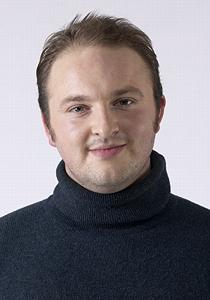|
<< -- 2 -- Roderic Dunnett EXQUISITE FINESSE

In a country more celebrated for largescale choral jamborees than for provincial recitals of solo song, the Tardebigge series, entitled 'Celebrating English Song' and founded by Jennie McGregor-Smith, is now one of the glories of the English summer. The airy, light and attractive interior of Tardebigge Church makes a perfect setting.
Sung entirely from memory, this was a dazzling recital by any standards. First came three Tippett arrangements of Purcell songs, full of vivid contrasts: the impassioned fieriness ('What magic has victorious love!') preceded by cooing beauty in 'Sweeter than Roses' provided ample drama from the outset; while more lulling was the affecting melodic line ('But where shall my soul repose?') of the beguiling and intimate 'Evening Hymn'.
Samuel Barber came next -- not so much 'English' song (as Kennedy's well-informed introductions reminded us) as song in English: in this case, settings of Theodore Roethke, Robert Graves and James Joyce. Kennedy is not only one of the most communicative of singers -- he really seems to 'live' the part -- but one of the most urbane too. The lovely opening of Graves's 'Into the wilderness', with soft, almost Debussian bell-like effects in the piano, contrasted with a delightfully bewitching, scherzo-like central section ('basilisk, cockatrice ... great rats on leather wings'), for which he found a particularly entertaining, confiding manner of delivery. The eerie pauses of Joyce's 'Solitary hotel' were full of hushed mystery -- yet the adaptable Barber almost slips into Blues vein midway. The song's teasingly abrupt ending was brilliantly carried off by both performers. Each of the other songs built to a powerful climax: the hair of 'My lizard' (Roethke) literally 'blazed in the sun' , and the overpowering poignancy of the last song -- Robert Graves in Auden vein -- 'But, O, refuse / To choose / Where chance may seem to give / Love in alternative.' furnished a massive -- and correspondingly tragic -- climax.
Kennedy opted to include a large number of folk song arrangements -- possibly just too many -- in this otherwise immensely satisfying recital: first, three by Percy Grainger, including the wittily characterised -- and superbly memorised -- 'Bold William Taylor' and a splendidly varied delivery of 'Lord Maxwell's Goodnight', with an especially effective third verse ('Then he tuik off a gay gold ring, thereat hung signets three, O!') -- again, nursed to a powerful climax. Later in the second half came Britten arrangements -- the beautifully dark and empathetic ballad 'Little Sir William', about a boy murdered at school; the charming, more relaxed 'Sweet Polly Oliver'; and six beautifully rounded verses of 'The trees they grow so high'. Here in the Britten, the sheer restrained artistry and fine-turned pointillism of the accompaniments gave Lepper's subtly attentive keyboard skills ample space to shine.

Andrew Kennedy
|
The audience, perhaps unjustly, seemed less enthralled by Judith Weir's 'take' on folksong -- six characterful settings entitled 'Scotch Minstrelsy': equally impressive were the nervy accompaniment and eerie sustaining of 'Bessie Bell and Mary Gray'; and the more declamatory 'Bonnie James Campbell' ('O back came his good horse, but never came he'). 'Lady Isobel', too, ensured someone never came home -- in this case, the Elf-Knight (or death-figure), whom she unexpectedly tricks and despatches -- rather than the other way round -- in a glorious rapid flurry at the close. 'The Gypsy Laddie', by contrast, is treated to rather lush chordings, while Lepper's handling of some rocking contrary motion patterns in the keyboard part of 'The Braes of Yarrow' was particularly beguiling.
Continue >>
Copyright © 29 August 2005
Roderic Dunnett, Coventry UK

|

